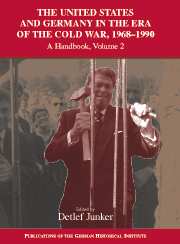Book contents
- Frontmatter
- POLITICS: Détente and Multipolarity: The Cold War and German-American Relations, 1968-1990
- SECURITY: German-American Security Relations, 1968-1990
- ECONOMICS: Cooperation, Competition, and Conflict: Economic Relations Between the United States and Germany, 1968-1990
- CULTURE: Culture as an Arena of Transatlantic Conflict
- SOCIETY: German-American Societal Relations in Three Dimensions, 1968-1990
- 1 “1968”: A Transatlantic Event and Its Consequences
- OUTLOOK: America, Germany, and the Atlantic Community After the Cold War
- Index
OUTLOOK: America, Germany, and the Atlantic Community After the Cold War
Published online by Cambridge University Press: 05 January 2013
- Frontmatter
- POLITICS: Détente and Multipolarity: The Cold War and German-American Relations, 1968-1990
- SECURITY: German-American Security Relations, 1968-1990
- ECONOMICS: Cooperation, Competition, and Conflict: Economic Relations Between the United States and Germany, 1968-1990
- CULTURE: Culture as an Arena of Transatlantic Conflict
- SOCIETY: German-American Societal Relations in Three Dimensions, 1968-1990
- 1 “1968”: A Transatlantic Event and Its Consequences
- OUTLOOK: America, Germany, and the Atlantic Community After the Cold War
- Index
Summary
Translated by Richard Sharp
A decade has already passed since the defining year of 1990. It was too much to hope that the collapse of the Soviet empire would bring about “the end of history.” Even the global triumph of liberal democracy, heralded at the time by Francis Fukuyama with a misleadingly worded historical-philosophical thesis, has not yet come to pass. Instead, Europe in general and American relations with Germany in particular have undergone a process that - despite many differences - bears resemblance to the course of events between 1945 and 1955.
On both occasions - in 1945 and in 1990 - deep-reaching changes took place in power relations in Europe and in the broader Atlantic realm. Contemporaries perceived this shift clearly on each occasion, and hindsight leaves no doubt about the importance of these turning points. Needless to say, 1945 was a more dramatic turning point for the history of Europe as a whole, especially for Germany, than the collapse of the communist regimes in 1990 was. Both of these new beginnings, however, gave way to a prolonged and very unclear transition period. Some far-sighted theorists in 1945 and 1990 did indeed perceive and describe the outlines of the coming systems. On each occasion, however, it was a full decade before the balance of power, while still precarious, had stabilized to the point that one could speak of a new international order or, more precisely, of a new order encompassing the Atlantic and reaching far beyond Eastern Europe.
- Type
- Chapter
- Information
- The United States and Germany in the Era of the Cold War, 1945–1990A Handbook, pp. 535 - 566Publisher: Cambridge University PressPrint publication year: 2004
- 2
- Cited by

